人教版九年级英语第一单元知识点总结
人教版初三英语第一单元知识点
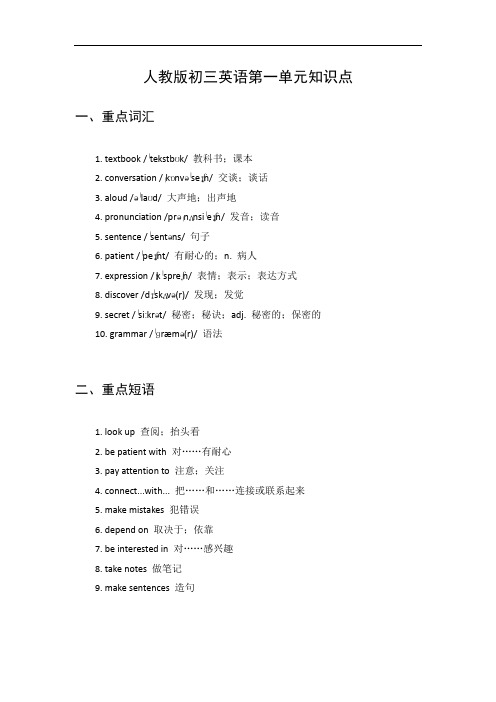
人教版初三英语第一单元知识点一、重点词汇1. textbook /ˈtekstbʊk/ 教科书;课本2. conversation /ˌkɒnvəˈseɪʃn/ 交谈;谈话3. aloud /əˈlaʊd/ 大声地;出声地4. pronunciation /prəˌnʌnsiˈeɪʃn/ 发音;读音5. sentence /ˈsentəns/ 句子6. patient /ˈpeɪʃnt/ 有耐心的;n. 病人7. expression /ɪkˈspreʃn/ 表情;表示;表达方式8. discover /dɪˈskʌvə(r)/ 发现;发觉9. secret /ˈsiːkrət/ 秘密;秘诀;adj. 秘密的;保密的10. grammar /ˈɡræmə(r)/ 语法二、重点短语1. look up 查阅;抬头看2. be patient with 对……有耐心3. pay attention to 注意;关注4. connect...with... 把……和……连接或联系起来5. make mistakes 犯错误6. depend on 取决于;依靠7. be interested in 对……感兴趣8. take notes 做笔记9. make sentences 造句三、重点句型1. —How do you study for a test? 你是怎样为考试而学习的?—I study by working with a group. 我通过和小组一起学习。
2. It's too hard to understand spoken English. 听懂英语口语太难了。
3. The more you read, the faster you'll be. 你读得越多,你就会读得越快。
4. Why did Wei Fen find it difficult to learn English? 为什么魏芬觉得学英语很难?5. I was afraid to ask questions because of my poor pronunciation. 因为我的发音不好,我害怕问问题。
人教版九年级英语上册各单元知识点归纳总结
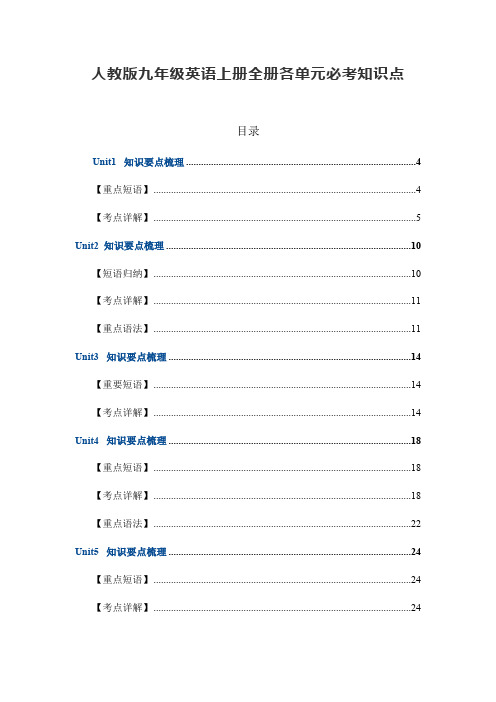
人教版九年级英语上册全册各单元必考知识点目录Unit1 知识要点梳理 (4)【重点短语】 (4)【考点详解】 (5)Unit2 知识要点梳理 (10)【短语归纳】 (10)【考点详解】 (11)【重点语法】 (11)Unit3 知识要点梳理 (14)【重要短语】 (14)【考点详解】 (14)Unit4 知识要点梳理 (18)【重点短语】 (18)【考点详解】 (18)【重点语法】 (22)Unit5 知识要点梳理 (24)【重点短语】 (24)【考点详解】 (24)【重点语法】 (27)Unit6 知识要点梳理 (30)【重点短语】 (30)【考点详解】 (30)【重点语法】 (33)Unit1 知识要点梳理【重点短语】1. have conversation with sb. 同某人谈话2. too…to… 太……而不能3. the secret to… ……的秘诀4. be afraid of doing sth./ be afraid to do sth. 害怕做某事5. look up 查阅6. repeat out loud 大声跟读7. make mistakes in 在……方面犯错误8. connect ……with… 把……和……连接/联系起来9. get bored 感到厌烦10. be stressed out 焦虑不安的11. pay attention to 注意;关注12. depend on 取决于;依靠13. the ability to do sth.. 做某事的能力【考点详解】1. by + doing 通过……方式(by是介词,后面要跟动名词,也就是动词的ing 形式)2. talk about 谈论,议论,讨论The students often talk about movie after class. 学生们常常在课后讨论电影。
talk to sb= talk with sb 与某人说话3. 提建议的句子:①What/ how about +doing sth.? 做…怎么样?(about后面要用动词的ing形式,这一点考试考的比较多)如:What/ How about going shopping?②Why don't you + do sth.? 你为什么不做…?如:Why don't you go shopping?③Why not + do sth. ? 为什么不做…?如:Why not go shopping?④Let's + do sth. 让我们做…...吧。
九年级上册英语笔记第一单元人教版

九年级上册英语笔记第一单元人教版九年级上册英语第一单元笔记(人教版)一、重点单词。
1. textbook.- 名词,意为“教科书;课本”。
例如:Our textbooks are very useful for our study.(我们的课本对我们的学习非常有用。
)2. conversation.- 名词,“交谈;谈话”。
常用搭配:have a conversation with sb.(与某人交谈)。
例如:I had a long conversation with my teacher yesterday.(我昨天和我的老师进行了一次长谈。
)3. aloud.- 副词,“大声地;出声地”。
它和loudly的区别在于:aloud侧重于让人能听到,没有“喧闹”的意思;loudly侧重声音喧闹、嘈杂。
例如:Please read the text aloud.(请大声朗读课文。
)4. pronunciation.- 名词,“发音;读音”。
例如:His pronunciation is very good.(他的发音很好。
)5. sentence.- 名词,“句子”。
例如:Make a sentence with this word.(用这个单词造一个句子。
)6. patient.- 形容词,“有耐心的”;名词,“病人”。
例如:Our English teacher is very patient with us.(我们的英语老师对我们非常有耐心。
)- be patient with sb.(对某人有耐心)7. secret.- 名词,“秘密;秘诀”;形容词,“秘密的;保密的”。
例如:It's a secret between us.(这是我们之间的秘密。
)8. look up.- 动词短语,“(在词典、参考书中或通过电脑)查阅;抬头看”。
例如:If you don't know this word, you can look it up in the dictionary.(如果你不知道这个单词,你可以在词典里查阅它。
人教版九年级全一册英语Unit1单元语法知识点总结
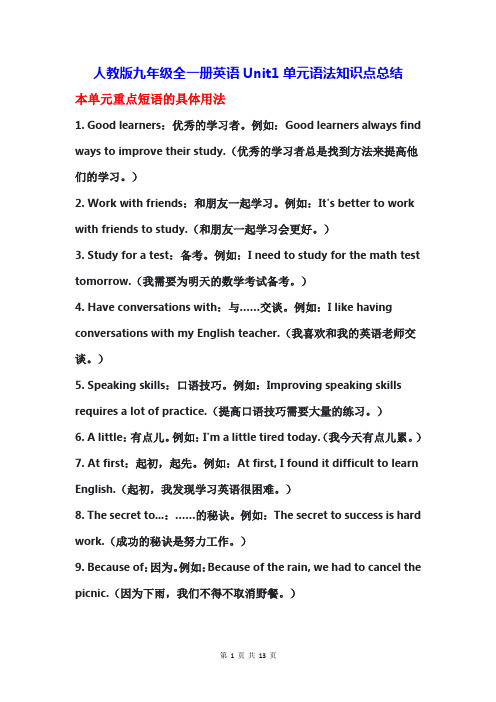
人教版九年级全一册英语Unit1单元语法知识点总结本单元重点短语的具体用法1. Good learners:优秀的学习者。
例如:Good learners always find ways to improve their study.(优秀的学习者总是找到方法来提高他们的学习。
)2. Work with friends:和朋友一起学习。
例如:It's better to work with friends to study.(和朋友一起学习会更好。
)3. Study for a test:备考。
例如:I need to study for the math test tomorrow.(我需要为明天的数学考试备考。
)4. Have conversations with:与……交谈。
例如:I like having conversations with my English teacher.(我喜欢和我的英语老师交谈。
)5. Speaking skills:口语技巧。
例如:Improving speaking skills requires a lot of practice.(提高口语技巧需要大量的练习。
)6. A little:有点儿。
例如:I'm a little tired today.(我今天有点儿累。
)7. At first:起初,起先。
例如:At first, I found it difficult to learn English.(起初,我发现学习英语很困难。
)8. The secret to...:……的秘诀。
例如:The secret to success is hard work.(成功的秘诀是努力工作。
)9. Because of:因为。
例如:Because of the rain, we had to cancel the picnic.(因为下雨,我们不得不取消野餐。
人教版九年级英语全册各单元知识点总结
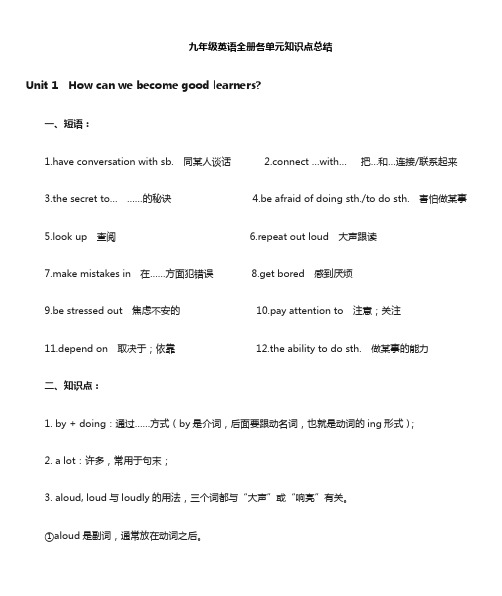
九年级英语全册各单元知识点总结Unit 1 How can we become good learners?一、短语:1.have conversation with sb. 同某人谈话2.connect …with… 把…和…连接/联系起来3.the secret to… ……的秘诀4.be afraid of doing sth./to do sth. 害怕做某事5.look up 查阅6.repeat out loud 大声跟读7.make mistakes in 在……方面犯错误8.get bored 感到厌烦9.be stressed out 焦虑不安的10.pay attention to 注意;关注11.depend on 取决于;依靠12.the ability to do sth. 做某事的能力二、知识点:1. by + doing:通过……方式(by是介词,后面要跟动名词,也就是动词的ing形式);2. a lot:许多,常用于句末;3. aloud, loud与loudly的用法,三个词都与“大声”或“响亮”有关。
①aloud是副词,通常放在动词之后。
②loud可作形容词或副词。
用作副词时,常与speak, talk, laugh等动词连用,多用于比较级,须放在动词之后。
③loudly是副词,与loud同义,有时两者可替换使用,可位于动词之前或之后。
4. not …at all:一点也不,根本不,not经常可以和助动词结合在一起,at all 则放在句尾;5. be / get excited about sth.:对…感到兴奋;6. end up doing sth:终止/结束做某事;end up with sth.:以…结束;7. first of all:首先(这个短语可用在作文中,使得文章有层次);8. make mistakes:犯错make a mistake 犯一个错误;9. laugh at sb.:笑话;取笑(某人)(常见短语)10. take notes:做笔记/记录;11. native speaker 说本国语的人;12. make up:组成、构成;13. deal with:处理、应付;14. perhaps = maybe:也许;15. go by:(时间)过去;16.each other:彼此;17.regard… as … :把…看作为…;18.change… into…:将…变为…;19. with the help of sb. = with one's help 在某人的帮助下(注意介词of和with,容易出题)20. compare … to …:把…比作… compare with 拿…和…作比较;21. instead:代替,用在句末,副词;instead of sth / doing sth:代替,而不是(这个地方考的较多的就是instead of doing sth,也就是说如果of后面跟动词时,要用动名词形式,也就是动词的ing形式)22.Shall we/ I + do sth.? 我们/我…好吗?23. too…to:太…而不能,常用的句型是too+形容词/副词+ to do sth.Unit 2 I think that moon cakes are delicious!一、短语:1. the Lantern Festival 元宵节2. the Dragon Boat Festival 端午节3. the Water Festival 泼水节4. remind sb. of 使某人想起5. eat five meals a day 一天吃五餐6. put on five pounds 体重增加了五磅7. treat sb. with. 用/以……对待某人8. be similar to... 与.......相似9. end up 最终成为/处于10. share sth. with sb. 与……分享……11. as a result结果12. one... the other... (两者中的) 一个…另一个…13. take sb. out for dinner 带某人出去吃饭14. dress up 乔装打扮15. haunted house 鬼屋16. the beginning of new life 新生命的开始二、知识点:1.宾语从句:(三大考点:引导词、时态和语序。
人教版九年级英语Unit1知识点总结

Unit1 How can we become good learners?一、语法点:介词by的用法1. by doing sth. 通过做某事的方式eg: —How can you improve your pronunciation? —By listening to tapes.2. 表示传达、传递的方式或媒介eg:How did you tell him about it, by letter or by e-mail?3. by + 交通工具eg: Every day I go to school by school bus.4. 在……的旁边eg: I’m sitting by the lake.5. 不迟于、在…之前eg: Please come home by 10 p.m.6. 创作eg: I have already read the book by Mo Yan.二、知识点1. by asking the teacher for help①by 介词通过,表示通过某种方式by doing sth. 通过做某事的方式eg: We visited Beijing University by riding bikes last weekend.②与ask相关的短语ask sb. for sth. 向某人要某物eg: He always asks his parents for money.ask sb. about sth. 向某人询问某事eg: Can I ask you about the result of test?ask sb. ( not) to do sth. 要求某人(不)做某事eg: My mother asks me not to play in the street.2. Do you have conversations with friends in English?have conversations with sb. = have a conversation with sb.与某人交谈/谈话make a conversation 编对话3. What about reading aloud to practice pronunciation?①aloud adv. 大声地;出声地eg: We should read English aloud. 我们应该大声读英语②practicev. 练习practice doing sth. 练习做某事eg: They practice speaking English every morning.n. 练习(不可数名词)eg: Students get practice in the English club.4. I’ve learned a lot (in) that way.in this/that way 用这种/那种方式5. Don’t read word by word.①word by word 一个字一个字的eg: He often read English word by word.②和word by word类似的短语有:day by day 一天天地one by one 一个一个地6. Well, be patient. It takes time.patientadj.耐心的①be patient with sb. 对某人有耐心eg: Our teachers are patient with us.②be patient to do sth. 有耐心做某事eg: Teachers should be patient to teach students.n. 病人eg: There are many patients in the hospital.7. The more you read, the faster you’ll be.the+比较级,the+比较级越…… 越……eg: The more you practice, the better you can understand.8. Why did Wei Fen find it difficult to learn English?find it + adj. + (for sb.) + to do sth. 发现做某事(对于某人)是…make it + adj.+ (for sb.) + to do sth. 使(某人)做某事成为…think it + adj. + (for sb.) + to do sth. 认为做某事(对于某人)是…feel it + adj. + (for sb.) + to do sth. 感觉做某事(对于某人)是…eg: Computers make it easier to keep in touch with friends.电脑使我们获得消息更容易了。
Unit1+知识清单+-2024-2025学年人教版九年级英语全册
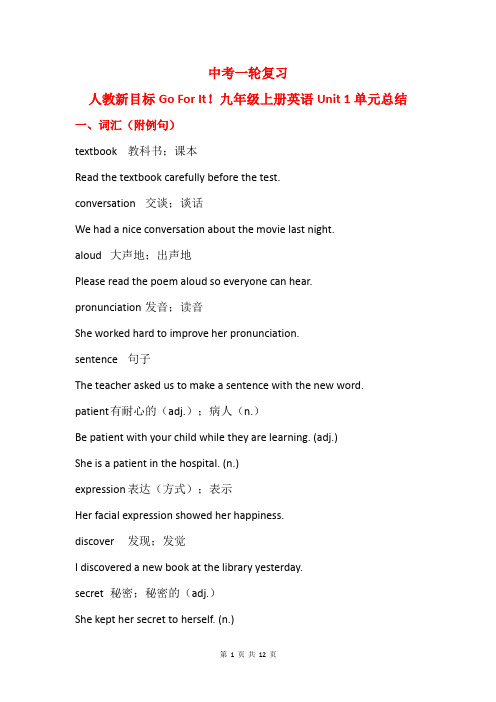
中考一轮复习人教新目标Go For It!九年级上册英语Unit 1单元总结一、词汇(附例句)textbook教科书;课本Read the textbook carefully before the test.conversation交谈;谈话We had a nice conversation about the movie last night.aloud大声地;出声地Please read the poem aloud so everyone can hear.pronunciation发音;读音She worked hard to improve her pronunciation.sentence句子The teacher asked us to make a sentence with the new word. patient有耐心的(adj.);病人(n.)Be patient with your child while they are learning. (adj.)She is a patient in the hospital. (n.)expression表达(方式);表示Her facial expression showed her happiness.discover发现;发觉I discovered a new book at the library yesterday.secret秘密;秘密的(adj.)She kept her secret to herself. (n.)This is a secret room in the house. (adj.)grammar语法I need to brush up on my grammar skills.repeat重复;重做Repeat the steps carefully to avoid mistakes.note笔记;记录(n.);注意;指出(v.)She took notes during the lecture. (n.)Please note that the deadline is next Friday. (v.)pal朋友;伙伴(非正式用语)My best pal and I have been friends since childhood.pattern模式;方式He found a pattern in the data that helped him solve the problem. physics物理学I enjoy studying physics because it's interesting.chemistry化学Chemistry is the study of matter and its interactions.partner搭档;同伴We worked on the project as partners.memorize记住;熟记Memorize these key points for the exam.increase增加;增长The population has increased significantly in recent years.speed速度(n.);加速(v.)She drove at a high speed on the highway. (n.)He sped up the car to pass the slow traffic. (v.)ability能力;才能She has a natural ability for music.brain大脑The brain is the control center of the body.active活跃的;积极的She is an active member of the school club.attention注意;关注Pay attention to the details of the problem.connect连接;与……有联系(v.);连接(n.)Connect the wires correctly to avoid sparks. (v.)The internet allows us to connect with people around the world. (n.) overnight一夜之间;在夜间The project was completed overnight by a team of experts.review回顾;复习She spent the evening reviewing her notes for the test. knowledge知识;学问She has a wealth of knowledge in ancient history.wisely明智地;聪明地He made a wise decision to invest in that company.二、短语知识(附例句)by making word cards 通过制作单词卡片释义:这是一种学习新单词的方法,通过制作卡片来加深记忆。
人教版九年级英语 Unit 1 重要语法知识点总结
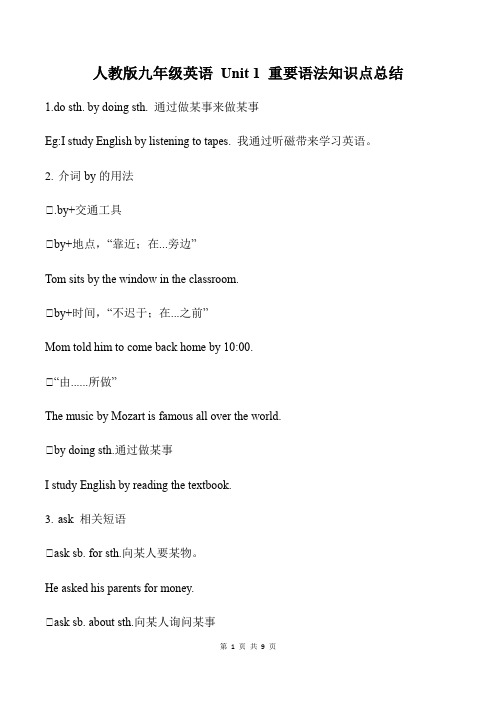
人教版九年级英语Unit 1 重要语法知识点总结1.do sth. by doing sth. 通过做某事来做某事Eg:I study English by listening to tapes. 我通过听磁带来学习英语。
2.介词by的用法①.by+交通工具①by+地点,“靠近;在...旁边”Tom sits by the window in the classroom.①by+时间,“不迟于;在...之前”Mom told him to come back home by 10:00.①“由......所做”The music by Mozart is famous all over the world.①by doing sth.通过做某事I study English by reading the textbook.3.ask 相关短语①ask sb. for sth.向某人要某物。
He asked his parents for money.①ask sb. about sth.向某人询问某事Can I ask about the result of the match?我可以问一下比赛的结果吗?①ask sb.(not) to do sth.要求某人(不)做某事(被动语态)--be asked (not) to do sth.被要求(不)做某事My mother asked me not to play in the street.4.have conversations with friends in English和朋友用英语交谈5.speaking skills 口语技能spoken English 英语口语6.read aloud 朗读 a little nervous 有点儿紧张7.It’s +adj.+(for sb.)+to do sth.做某事对某人来说是怎么样的。
It’s easier for you to pay attention to it for a long time.对于你来说长时间集中注意力在它(你感兴趣的事儿)上面是也更容易的。
人教版(新目标)初中英语九年级上册Unit1知识点汇总
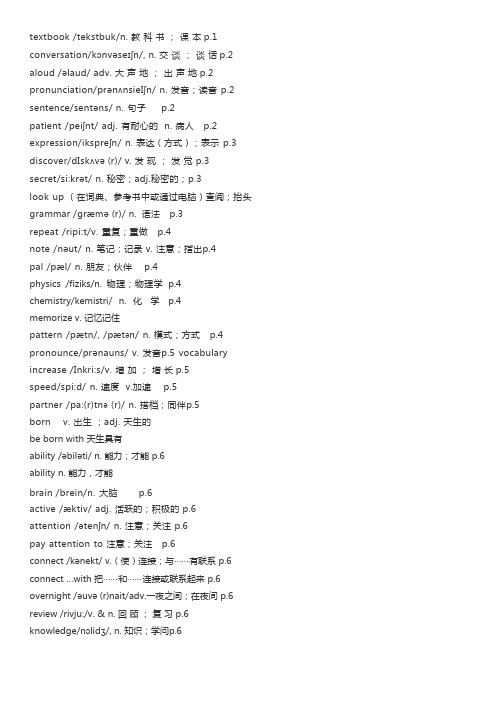
textbook /tekstbuk/n. 教科书;课本 p.1 conversation/kɔnvəseɪʃn/, n. 交谈;谈话 p.2 aloud /əlaud/ adv. 大声地;出声地 p.2 pronunciation/prənʌnsieIʃn/ n. 发音;读音p.2 sentence/sentəns/ n. 句子p.2patient /peiʃnt/ adj. 有耐心的n. 病人p.2 expression/ikspreʃn/ n. 表达(方式);表示p.3 discover/dIskʌvə(r)/ v. 发现;发觉 p.3secret/si:krət/ n. 秘密;adj.秘密的;p.3look up (在词典、参考书中或通过电脑)查阅;抬头grammar /græmə(r)/ n. 语法p.3repeat /ripi:t/v. 重复;重做p.4note /nəut/ n. 笔记;记录 v. 注意;指出p.4pal /pæl/ n. 朋友;伙伴p.4physics /fiziks/n. 物理;物理学p.4chemistry/kemistri/ n. 化学p.4memorize v. 记忆记住pattern /pætn/,/pætən/ n. 模式;方式p.4 pronounce/prənauns/ v. 发音p.5 vocabulary increase /Inkri:s/v. 增加;增长 p.5speed/spi:d/ n. 速度 v.加速p.5partner /pa:(r)tnə(r)/ n. 搭档;同伴p.5born v. 出生;adj. 天生的be born with 天生具有ability /əbiləti/ n. 能力;才能 p.6ability n. 能力,才能brain /brein/n. 大脑p.6active /æktiv/ adj. 活跃的;积极的 p.6attention /ətenʃn/ n. 注意;关注 p.6pay attention to 注意;关注p.6connect /kənekt/ v.(使)连接;与⋯⋯有联系 p.6 connect …with 把⋯⋯和⋯⋯连接或联系起来 p.6 overnight /əuvə(r)nait/adv.一夜之间;在夜间 p.6 review /rivju:/v. & n. 回顾;复习 p.6 knowledge/nɔlidʒ/, n. 知识;学问p.6leftlong adj. 终生的;毕生的wisely /waizli/adv. 明智地;聪明地 p.6Annie /æni/安妮(女名)p.2Alexander GrahamBell 格雷厄姆•贝尔 p.602U n i t 1 知识梳理Unit 1 How can we become good learners?【重点短语】1.good learners 优秀的学习者2.work with friends 和朋友一起学习3. study for a test 备考4.have conversations with 与……交谈5.speaking skills 口语技巧6.a little 有点儿7.a t first 起初起先8.t he secret to ............ 的秘诀9.b ecause of 因为10.as well 也11.look up 查阅;抬头看12.so that 以便,为了13.the meaning of ……的意思14.make mistakes 犯错误15.talk to 交谈16.depend on 依靠依赖17.in common 共有的18.pay attention to 注意关注19.connect …with …把……联系20.forexample 例如21.think about 考虑22.even if 即使尽管纵容23.look for 寻找24.worry about 担心担忧25.make word cards 制作单词卡片26.ask the teacher for help 向老师求助27.read aloud 大声读28.spoken English 英语口语29.give a report 作报告30.word by word 一字一字地31.so……that 如此……以至于32.fallin love with 爱上33.something interesting 有趣的事情34.take notes 记笔记35.how often 多久一次36.a lot of 许多37.the ability to do sth. 做某事的能力38.learning habits 学习习惯39.be interested in 对……感兴趣40.get bored 感到无聊【重点句型】1.提建议的句子:①What/ how about +doing sth.? 做…怎么样?如:What/ How about going shopping?②Why don't you + do sth.? 你为什么不做…?如:Why don't you go shopping?③Why not + do sth. ? 为什么不做…?如:Why not go shopping?④Let's + do sth. 让我们做…吧。
人教版九年级英语unit1知识点大全
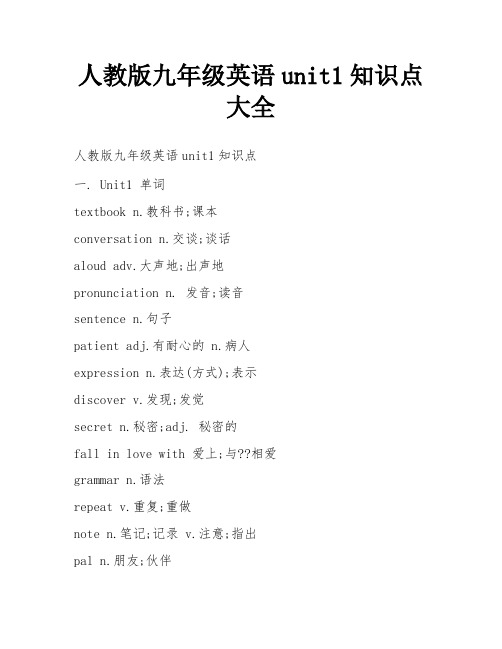
人教版九年级英语unit1知识点大全人教版九年级英语unit1知识点一. Unit1 单词textbook n.教科书;课本conversation n.交谈;谈话aloud adv.大声地;出声地pronunciation n. 发音;读音sentence n.句子patient adj.有耐心的 n.病人expression n.表达(方式);表示discover v.发现;发觉secret n.秘密;adj. 秘密的fall in love with 爱上;与??相爱grammar n.语法repeat v.重复;重做note n.笔记;记录 v.注意;指出pal n.朋友;伙伴pattern n.模式;方式physics n.物理;物理学chemistry n.化学partner n.搭档;同伴pronounce v.发音increase v.增加;增长speed n.速度 v.加速ability n.能力;才能brain n.大脑active adj.活跃的;积极的attention n.注意;关注pay attention to 注意;关注connect v.(使)连接;与??有联系connect…with... 把??和??连接或联系起来overnight adv.一夜之间;在夜间review v.& n.回顾;复习knowledge n.知识;学问wisely adv.明智地;聪明地Annie 安妮(女名)Alexander Graham Bell 格雷厄姆 ? 贝尔二.Unit1知识梳理Unit 1 How can we bee good learners?【重点短语】1. good learners 优秀的学习者2. work with friends 和朋友一起学习3. study for atest 备考4.have conversations with 与……交谈5.speaking skills 口语技巧6.a little 有点儿7.at first 起初起先8.the secret to... .......的秘诀9.because of 因为10.as well 也11.look up 查阅;抬头看12.so that 以便,为了13.the meaning of ……的意思14.make mistakes 犯错误15.talk to 交谈16.depend on 依靠依赖17.in mon 共有的18.pay attention to 注意关注19.connect …with …把……联系20.for example 例如21.think about 考虑22.even if 即使尽管纵容23.look for 寻找24.worry about 担心担忧25.make word cards 制作单词卡片26.ask the teacher for help 向老师求助27.read aloud 大声读28.spoken English 英语口语29.givea report 作报告30.word by word 一字一字地31. so……that 如此……以至于32.fall in love with 爱上33.something interesting 有趣的事情34.take notes 记笔记35.how often 多久一次36.a lot of 许多37.theability to do sth. 做某事的能力38.learning habits 学习习惯39.be interested in 对……感兴趣40.get bored 感到无聊【重点句型】1.提建议的句子:①What/ how about +doing sth.? 做…怎么样?如:What/ How about going shopping?②Why don't you + do sth.? 你为什么不做…?如:Why don't you go shopping?③Why not + do sth. ? 为什么不做…?如:Why not go shopping?④Let's + do sth. 让我们做…吧。
人教版九年级英语上册第一单元知识点汇总
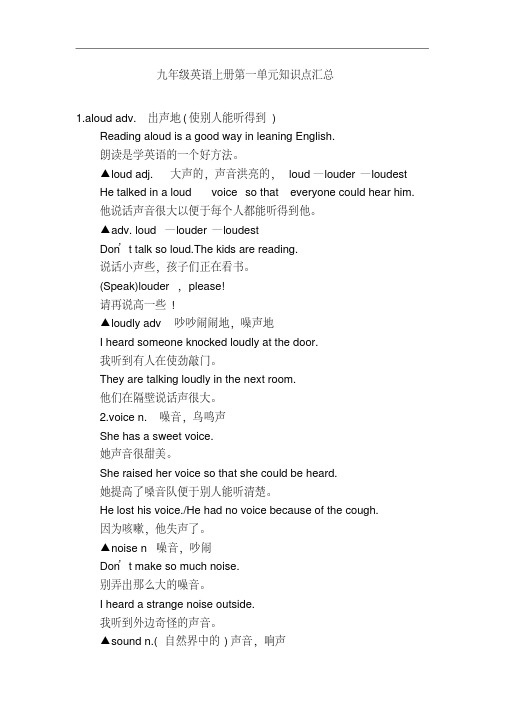
九年级英语上册第一单元知识点汇总1.aloud adv.出声地(使别人能听得到)Reading aloud is a good way in leaning English.朗读是学英语的一个好方法。
▲loud adj. 大声的,声音洪亮的,loud―louder―loudestHe talked in a loud voice so that everyone could hear him.他说话声音很大以便于每个人都能听得到他。
▲adv. loud―louder―loudestDon’t talk so loud.The kids are reading.说话小声些,孩子们正在看书。
(Speak)louder,please!请再说高一些!▲loudly adv吵吵闹闹地,噪声地I heard someone knocked loudly at the door.我听到有人在使劲敲门。
They are talking loudly in the next room.他们在隔壁说话声很大。
2.voice n.噪音,鸟鸣声She has a sweet voice.她声音很甜美。
She raised her voice so that she could be heard.她提高了嗓音队便于别人能听清楚。
He lost his voice./He had no voice because of the cough.因为咳嗽,他失声了。
▲noise n噪音,吵闹Don’t make so much noise.别弄出那么大的噪音。
I heard a strange noise outside.我听到外边奇怪的声音。
▲sound n.(自然界中的)声音,响声Sound travels slower than light.声音的传播比光慢。
3.memory n.(计算机的)储存器A lot of information is stored in the memory.计算机的储存器能储存很多信息。
人教版九年级英语全册:Unit 1 基础知识梳理

精品基础教育教学资料,仅供参考,需要可下载使用!Unit 1 How can we become good learners?第1课时Section A(1a2d)aloud adv.大声地;出声地pronunciation n.发音;读音。
其动词形式为pronouncepatient adj. 有耐心的。
n. 病人。
其反义词为impatient 【拓展】(1)aloud, loud和loudly都意为“大声地”,但用法有区别。
①aloud 强调能让人听得见。
常与动词read, call等连用。
如:Read aloud so that we can all hear you. 大点声读,以便我们大家都能听见你。
②loud 强调声音响亮。
常与动词speak, talk, say, laugh等连用。
常用比较级形式。
如:Facts speak louder than words. 事实胜于雄辩。
③loudly 有时可与loud通用,但含有“喧闹”或者“嘈杂”的意味。
如:Don't talk so loudly. 别这么高声说话。
(2)patient的常用短语:be patient with sb. 对某人有耐心;be patient to do sth. 有耐心做某事;be patient of…能忍受/容忍……have conversations with 和……交谈finish doing sth. 完成做某事give a report 做报告word by word 逐字/词地☆It's too hard to understand spoken English.理解英语口语太难了。
“It is+adj.+to do sth.”结构,it在句中作形式主语,真正的主语是动词不定式的内容。
如:He speaks in a low voice. It's too hard to hear him clearly. 他说话声音很低,太难听清楚他说什么了。
人教版九年级第一单元知识点

6.key words 关键词7.make mistakes in 在……方面犯错误8.be born with 天生具有9.depend on 取决于;依靠10.pay attention to〔介词〕留意,关注11.connect …with… 把……和……连接/联络起来12.Practice makes perfect 熟能生巧13.be stressed out 焦虑担心的;压力过大14.ask the teacher for help 向老师寻求扶植15.be afraid of doing sth/ be afraid to do sth 胆怯做某事16.fall in love with 爱上17.body language 肢体语言18.key words 关键词19.look up 查阅;向上看20.repeat out loud 大声跟读【Exercise】完成句子1.她说她通过做英语练习来学习语法.She said she studied grammar En glish exercises.2.你通过对话来练习英语口语吗Do you practice spoken English3.制作单词卡对学习英语单词很有扶植。
is very helpful to learn English words.4.我认为学习英语的最好方式是运用它。
I think the best way to learn English is.5.请问,你是怎样练习听力技能的Excuse me,do you practice6. 这两个国家有许多一样点。
The two countries have a lot __________ __________.7. 学习语言的时候,你不能胆怯犯错误。
When learning a language, you can’t __________ __________ __________ make mistakes.8. 大声朗读有助于你培育语感。
人教版九年级英语第一单元必记知识点
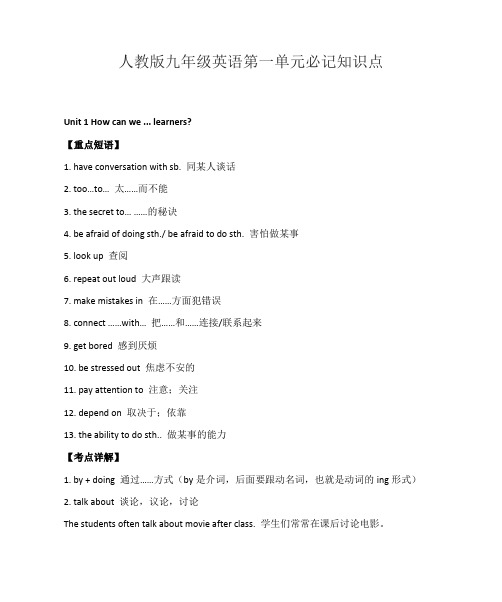
人教版九年级英语第一单元必记知识点Unit 1 How can we ... learners?【重点短语】1. have conversation with sb. 同某人谈话2. too…to… 太……而不能3. the s ecret to… ……的秘诀4. be afraid of doing sth./ be afraid to do sth. 害怕做某事5. look up 查阅6. repeat out loud 大声跟读7. make mistakes in 在……方面犯错误8. connect ……with… 把……和……连接/联系起来9. get bored 感到厌烦10. be stressed out 焦虑不安的11. pay attention to 注意;关注12. depend on 取决于;依靠13. the ability to do sth.. 做某事的能力【考点详解】1. by + doing 通过……方式(by是介词,后面要跟动名词,也就是动词的ing形式)2. talk about 谈论,议论,讨论The students often talk about movie after class. 学生们常常在课后讨论电影。
talk to sb= talk with sb 与某人说话3. 提建议的句子:①What/ how about +doing sth.? 做…怎么样?(about后面要用动词的ing形式,这一点考试考的比较多)如:What/ How about going shopping?②Why don't you + do sth.? 你为什么不做…?如:Why don't you go shopping?③Why not + do sth. ? 为什么不做…?如:Why not go shopping?④Let's + do sth. 让我们做…...吧。
百度文库 人教版英语九年级一单元知识点总结
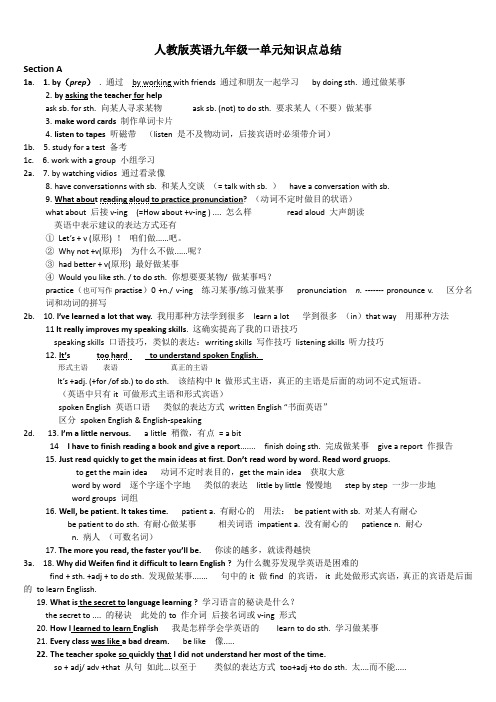
人教版英语九年级一单元知识点总结Section A1a. 1. by(prep).通过by working with friends 通过和朋友一起学习by doing sth. 通过做某事2.by asking the teacher for helpask sb. for sth. 向某人寻求某物ask sb. (not) to do sth. 要求某人(不要)做某事3.make word cards制作单词卡片4.listen to tapes听磁带(listen 是不及物动词,后接宾语时必须带介词)1b. 5. study for a test 备考1c. 6. work with a group 小组学习2a. 7. by watching vidios 通过看录像8.have conversationns with sb. 和某人交谈(= talk with sb. )have a conversation with sb.9.What about reading aloud to practice pronunciation? (动词不定时做目的状语)what about 后接v-ing (=How about +v-ing ) .... 怎么样read aloud 大声朗读英语中表示建议的表达方式还有①Let’s + v (原形) !咱们做......吧。
②Why not +v(原形) 为什么不做......呢?③had better + v(原形) 最好做某事④Would you like sth. / to do sth. 你想要要某物/ 做某事吗?practice(也可写作practise)0 +n./ v-ing 练习某事/练习做某事pronunciation n. ------- pronounce v. 区分名词和动词的拼写2b. 10. I’ve learned a lot that way.我用那种方法学到很多learn a lot 学到很多(in)that way 用那种方法11 It really improves my speaking skills. 这确实提高了我的口语技巧speaking skills 口语技巧,类似的表达:wrriting skills 写作技巧listening skills 听力技巧12.It’s too hard to understand spoken English.形式主语表语真正的主语It’s +adj. (+for /of sb.) to do sth. 该结构中It 做形式主语,真正的主语是后面的动词不定式短语。
人教版九年级英语unit1知识点总结

人教版九年级英语unit1知识点总结人教版九年级英语Unit 1是初中阶段的第一个单元,主要涵盖了基础的英语知识点,如名词的单复数、冠词的用法、动词的时态和情态动词等。
以下是对Unit 1的知识点进行总结。
1. 名词的单复数:在英语中,我们经常要用到名词的单复数形式。
名词的复数形式有很多规则,比如在名词后面加-s或-es,如dogs、boxes等。
但也有一些特殊的规则,如在名词后加-ies构成复数,如flies、butterflies等。
还有一些名词是不规则的,比如child变成children,woman变成women等。
2. 冠词的用法:在英语中,冠词分为不定冠词和定冠词。
不定冠词包括a和an,用于泛指某个人或物。
定冠词包括the,用于特指某个人或物。
冠词的使用要根据具体语境来确定,需要注意的是,当我们第一次提及某物时,要用不定冠词,而后续提及相同物品时,要用定冠词。
3. 动词的时态:动词的时态分为过去时、现在时和将来时。
过去时表示过去发生的动作或状态,常用的过去时的结构有一般过去时、过去进行时和过去完成时。
现在时表示现在或经常发生的动作或状态,常用的现在时的结构有一般现在时、现在进行时和现在完成时。
将来时表示将来要发生的动作或状态,常用的将来时的结构有一般将来时和将来进行时。
4. 情态动词:情态动词是特殊的动词形式,它们用来表示情感、能力、可能性、义务等。
常见的情态动词有can、could、may、might、shall、should、will、would、must等。
情态动词后面一般跟动词原形,表示对某个动作的推测、意愿、要求等。
5. 祈使句:祈使句是一种特殊的句型,用于表达命令、请求、建议等。
祈使句一般省略主语,用动词原形开头。
例如,"Open the door"表示"打开门","Turn off the light"表示"关掉灯"。
- 1、下载文档前请自行甄别文档内容的完整性,平台不提供额外的编辑、内容补充、找答案等附加服务。
- 2、"仅部分预览"的文档,不可在线预览部分如存在完整性等问题,可反馈申请退款(可完整预览的文档不适用该条件!)。
- 3、如文档侵犯您的权益,请联系客服反馈,我们会尽快为您处理(人工客服工作时间:9:00-18:30)。
人教版九年级英语第一单元知识点总结教学目标:1.学会运用how来询问做事方式2.学会运用by+doing的结构表达做事方式3.掌握specific; memorize; grammar; differently frustrate; frustrating; quickly; add; not at all; excited; end up,pronounce; spoken; slowly; mistake; make mistakes; comma; challenge; solution; native; speaker; make up.等词汇或短语,later on, it doesn’t matter, be afraid of, laugh at, take notes,realize, matter, afraid, complete, secret, term, trouble, fast, learner, impress。
4.学会运用why don't you……?和should来表示建议。
授课内容:一.重点词汇:1. differently adv. different adj.2. quick adj. quickly adv.3. slow adj. slowly adv.4. easy adj. easily adv.5. friend n.朋友 friendship n. 友谊6. important adj. 重要的 unimportant不重要的7. learn v. 学习 learner n. 学习者8. impress v. 使感动 impressed adj. 感动的9. pronounce v. 发音 pronunciation n. 发音10. help v. 帮助 helpful adj. 有帮助的11. science n. 科学 scientist n. 科学家12. happy adj. 高兴的 unhappy adj. 不高兴的13. disagreement n. 不同意见 agreement n. 同意disagree v. 不同意 agree v. 同意二.重点短语、句型其用法:1. by + doing 通过……方式如:by studying with a groupby 还可以表示:“在…旁”、“靠近”、“在…期间”、“用、”“经过”、“乘车”等如:I live by the river.I have to go back by ten o’clock.The thief entered the room by the window.The student went to park by bus.2. talk about 谈论,议论,讨论如:The students often talk about movie after class.学生们常常在课后讨论电影。
talk to sb. === talk with sb. 与某人说话3. 提建议的句子:①What/ how about +doing sth.?如:What/ How about going shopping?②Why don’t you + do sth.? 如:Why don’t you go shopping?③Why not + do sth. ? 如:Why not go shopping?④Let’s + do sth. 如:Let’s go shopping⑤Shall we/ I + do sth.? 如:Shall we/ I go shopping?4. a lot 许多常用于句末如:I eat a lot. 我吃了许多。
a lot of许多 == lots of 许多常与名词连用5. too…to 太…而不能常用的句型 too+adj./adv. + to do sth.如:I’m too tired to say anything. 我太累了,什么都不想说。
6. aloud, loud与loudly的用法三个词都与"大声"或"响亮"有关。
①aloud是副词,重点在出声能让人听见,但声音不一定很大,常用在读书或说话上。
通常放在动词之后。
aloud没有比较级形式。
如: He read the story aloud to his son.他朗读那篇故事给他儿子听。
②loud可作形容词或副词。
用作副词时,常与speak, talk,laugh等动词连用,多用于比较级,须放在动词之后。
如:She told us to speak a little louder. 她让我们说大声一点。
③loudly是副词,与loud同义,有时两者可替换使用,但往往含有令人讨厌或打扰别人的意思,可位于动词之前或之后。
如: He does not talkloudly or laugh loudly in public.他不当众大声谈笑。
7. not …at all 一点也不根本不如:I like milk very much. I do n’t like coffee at all.我非常喜欢牛奶。
我一点也不喜欢咖啡。
not经常可以和助动词结合在一起,at all 则放在句尾8. be / get excited about sth. ===be / get excited about doing sth. ===be excited to do sth. 对…感兴奋如:I am / get excited about going to Beijing.===I am excited to go to Beijing. 我对去北京感到兴奋。
9. ① end up doing sth 终止做某事,结束做某事如:The party ended up singing. 晚会以唱歌而结束。
② end up with sth. 以…结束如:The party ended up with her singing. 晚会以她的歌唱而告终。
10. first of all 首先. to begin with 一开始later on 后来、随11. also 也、而且(用于肯定句)常在句子的中间either 也(用于否定句)常在句末too 也 (用于肯定句) 常在句末I am also a student. 我也是一个学生I am a student too. 我也是一个学生。
I am not a student either. 我也不是一个学生。
12. make mistakes 犯错如:I often make mistakes. 我经常犯错。
make a mistake 犯一个错误如: I have made a mistake.我已经犯了一个错误。
13. laugh at sb. 笑话;取笑(某人)如:Don’t laugh at me!不要取笑我!14. take notes 做笔记,做记录15. enjoy doing sth . 喜欢做…乐意做… 如:She enjoys playing football. 她喜欢踢足球。
enjoy oneself 过得愉快如:He enjoyed himself. 他过得愉快。
16. native speaker 说本族语的人17. make up 组成、构成18. one of +(the+ 形容词最高级)+名词复数形式…其中之一如: She is one of the most popular teachers.她是最受欢迎的教师之一。
19. It’s +形容词+(for sb. ) to do sth. (对于某人来说)做某事…如:It’s difficult (for me ) to study English.对于我来说学习英语太难了。
句中的it 是形式主语,真正的主语是to study English20. practice doing 练习做某事如:She often practice speaking English. 她经常练习说英语。
21. decide to do sth. 决定做某事如:LiLei has decided to go to BeiJing . 李雷已经决定去北京。
22. unless 假如不,除非引导条件状语从句如:You will fail unless you work hard..假如你不努力你会失败。
I won’t write unless he writes first. 除非他先写要不我不写23. deal with 处理如:I dealt with a lot of problem.24. worry about sb./ sth. 担心某人/ 某事如:Mother worried about her son just now.妈妈刚才担心她的儿子。
25. be angry with sb. 对某人生气如:I was angry with her. 我对她生气。
26. perhaps === maybe 也许27. go by (时间) 过去如: Two years went by. 两年过去了。
28. see sb. / sth. doing 看见某人正在做某事强调正在发生see sb. / sth. do 看见某人在做某事如:如: She saw him drawing a picture in the classroom.她看见他正在教室里画画。
29. each other 彼此30. regard… as … 把…看作为…. 如:The boys regarded Anna as a fool. 这些男孩把安娜看成傻瓜。
31. too many 太多修饰可数名词如:too many girlstoo much 太多修饰不可数名词如:too much milkmuch too 太修饰形容词如:much too beautiful32. change… into… 将…变为…如:The magician changed the pen into a book.这个魔术师将这支笔变为一本书。
33. with the help of sb. == with one’s help 在某人的帮助下如:with the help of LiLei == with LiLei’s help在李雷的帮助下34. compare … to … 把…与…相比如:Compare you to Anna, you are lucky.你和安娜相比,你是幸运的。
